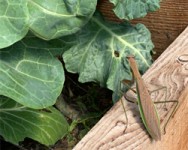Orleans Regional Vegetable Meeting
Event Details
Date
February 15, 2023
Time
12:45 pm - 4:00 pm
Location
CCE Orleans County
12690 Route 31
Albion, NY 14411
Cost
Registration Fee per Person : $10.00
Pre-register by calling 585-406-3419. Pay at the door by cash or check.
Host
Cornell Vegetable ProgramElizabeth Buck
585-406-3419
email Elizabeth Buck

DEC credits available: 2.25 in 1a and 10; 2.0 in 23; 1.5 in 22; and 0.5 in CORE (used in all categories)
Meeting cost is $10 per person, payable at the door via cash or check. Pre-registration requested by 5:00 pm on Monday, February 13. Call Elizabeth Buck at 585-406-3419.
12:45pm: Sign-in, survey completion
1:00 pm: Welcome and announcements
1:05 pm: Pesticide Safety for the Family & You -- Mary Centrella, Pesticide Safety Education Program
This presentation will focus on understanding and mitigating the health risks associated with pesticide usage and offer safety solutions.
1:35 pm: Managing White Mold -- Elizabeth Buck, CCE Cornell Vegetable Program
White mold is a difficult, long-lived disease that will attack most vegetable crops. Successfully managing a farm with white mold requires a range of preventative actions, regular scouting, and chemical management techniques.
1:50 pm: Encouraging Beneficial Insects -- Amara Dunn, NYS IPM Program
This hands-on session will go over what types of beneficials eat our most annoying pests and which ones can be found in the local landscape. You'll learn how to attract these hard-working insects into your field and keep them safe.
2:20 pm: Break
2:30 pm: Herbicide Options for Cole Crops -- Christy Hoepting, CCE Cornell Vegetable Program
An overview of herbicides for cole crops drawing heavily from recent research studies.
3:00 pm: Avoiding, Spotting and Treating Strawberry Disease -- Anya Osatuke, Berry Specialist, CCE Harvest NY
Identification of strawberry diseases can be nuanced - come learn some ID tricks. Anya will also cover techniques and tools to avoid diseases, explain how to break disease cycles, and give examples of chemical control strategies.
3:45 pm: What Can be Done about Insect-Vectored Vine Crop Diseases? -- Elizabeth Buck, Cornell Vegetable Program
Aphid-vectored viruses are a locally common and costly problem for vine crop growers. Cucurbit Yellow Vine Decline is spread by squash bugs and is suspected of becoming more widespread in WNY. Can insecticides manage these diseases? Is there a solution?
4:00 pm: Adjourn. Those meeting recertification credit requirements pick up their certificates.

Upcoming Events
What is my vine trying to tell me?
May 15, 2024 : What is my vine trying to tell me?
Plattsburgh, NY
Are your grapevines showing signs of discoloration or stunted growth? Don't ignore these warning signs! Join us on May 15th at the Clinton County CCE office to learn about the essential nutrients that grapevines require to thrive, identify the symptoms of nutrient deficiencies, and how to fix them. Don't miss out on this opportunity to improve your grapevine cultivation skills! Attendance is free, but registration is required.
How man's best friend can help find Spotted Lanternfly
May 21, 2024
Millbrook, NY
Come and join us at the Dutchess County CCE office on May 21st for a special demonstration by Jennifer Fimbel, the Agriculture and Horticulture Program Leader with Dutchess County CCE. You will get to see her SLF K9 Cole in action as they demonstrate how man's best friend can be used to detect the Spotted Lanternfly. Attendance is free, but registration is required
What is my vine trying to tell me?
May 22, 2024 : What is my vine trying to tell me?
Greenwich, NY
Are your grapevines showing signs of discoloration or stunted growth? Don't ignore these warning signs! Join us on May 22nd at the Washington County Fair Grounds to learn about the essential nutrients that grapevines require to thrive, identify the symptoms of nutrient deficiencies, and how to fix them. Don't miss out on this opportunity to improve your grapevine cultivation skills! Attendance is free, but registration is required.












































